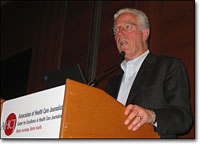Tag
ahcj09
-
•
Reinhardt breaks down income statements
Princeton economist – and Health Journalism 2009 keynote speaker – Uwe Reinhardt’s latest post on The New York Times’ Economix…

-
Primer on reform draws from AHCJ presentation
Sarasota Health News reporter and editor David Gulliver released his own evaluation of health care reform, drawing on the Dartmouth…

-
Reinhardt calls for price research/transparency
Princeton health economist Uwe Reinhardt – the keynote speaker at Health Journalism 2009 – spoke to U.S. News & World…

-
•
Genetic, environmental factors at work in aging process (#ahcj09)
Aging is a biological, psychological and social process, as four researchers explained at Health Journalism 2009. Aging research is important…

-
Blog breaks down Wyden’s talk, plan (#ahcj09)
AHCJ board member Ivan Oransky blogged about Sen. Ron Wyden’s talk at Health Journalism 2009 on April 17. Wyden’s Healthy…

-
•
Safety initiatives borrowed from transportation industry (#ahcj09)
Patient safety improvement and medical error prevention programs in U.S. hospitals often take their inspiration from the aviation industry’s long-standing…

-
•
Mental health reporter blogs from conference (#ahcj09)
Mental health journalist John McManamy is blogging from Health Journalism 2009. On Thursday he went on the field trip that…

-
•
Mental health: Reporting beyond the labels (#ahcj09)
If you live with mental illness, tell the truth about it. If you report on mental illness, watch what you…

-
•
Doctor shortage a ‘crisis’ in Wash. (#ahcj09)
Marc Ramirez of The Seattle Times writes about Health Journalism 2009, focusing on a panel about medically underserved areas. He…

-
•
Costs critical to stories about health care (#ahcj09)
Guest post by Jason Roberson of The Dallas Morning News For the most part, health care journalists are shortchanging readers…


